I’ve recently looked at the ideology of Afrikanerdom, after taking some criticism for ‘bashing’ a small but very vocal sect of anti-Smuts Afrikaners (some even in my own family). I’ve contested that they do not epitomise Afrikanerdom but seem to think they do. It’s a complex subject, as ‘Afrikanerdom’ is as white as it is black, but bear with me.
When it comes to the ‘Boer War’ (The South African War 1899-1902), there are two very hotly debated areas, both ‘shape’ Afrikanerdom – certainly in the white sense of it. The first is the idea of the “Bitter-Einder” (the Bitter Enders), the group of Afrikaners who painfully decided to continue the war on ‘guerrilla principles’ after the ‘conventional phase’ ended and Pretoria fell. Some historians point to these guerrillas as having brought the catastrophe of the concentration camps and the scorched earth farm buring policy on themselves – they’re to blame as the British had little choice. Little is really understood as to ‘why’ they continued the fight, as the fight was clearly lost – sheer madness the only conclusion. But, it’s in the ‘why’ that we find Afrikanerdom.

The second hotly debated subject is Jan Smuts, his impact to South African politics and ‘Afrikaner’ identity spans 6 decades, no other ‘Afrikaner’ can hold a flame to it. His detractors fall on old National Party propaganda and political smearing and old family folklore to paint him as ‘turning British’ for reconciling the warring British and Boer races (and by some strange leap in logic some also point to him as responsible for the concentration camps). Little time is given to actually reading what Smuts said or wrote and a strange almost belligerent hatred overrides all reason.
Sir Winston Churchill said of Smuts that “He fought for his own country; he thought for the whole world.” by that he meant Smuts remained an Afrikaner patriot for one but also philosophised for all mankind. Churchill’s long time admiration for Smuts also lay in his abilities as one of the few successful Bitter-Einder Boer Generals, not in a need for him to identify as somehow British. Smuts’ context of Afrikanerdom is found in his justification for being a Bitter-Einder’ and there is nothing better to understand his mind and to understand the ground zero of 20th century ‘Afrikanerdom’ and the modern white Afrikaner psyche than to read what Smuts himself puts down.
What follows are some extracts .. they are well worth the read, and anyone who walks away from reading this still thinks that Jan Smuts is somehow ‘English’ needs their brain replaced – for they have never taken the time to read what the man actually wrote. Here’s an Afrikaner at heart – simple.
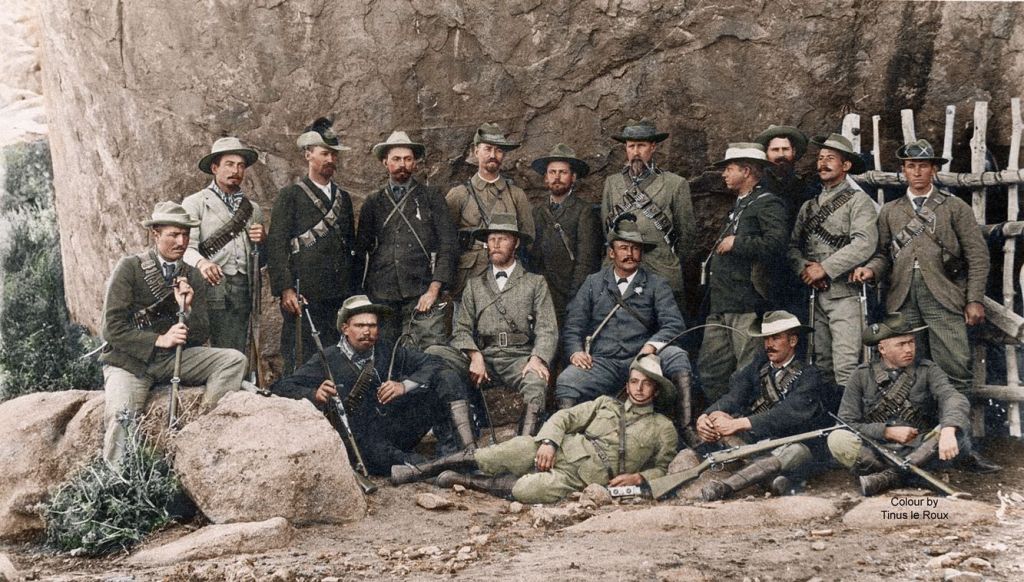
Image: General Jan Smuts (seated centre) with his Commando, colourised by Tinus Le Roux
This is a letter, written to W.T. Stead by Jan by Smuts whilst in the field with his commando at Vanrhynsdorp on 4 January 1902 (Source: Published from his private papers by Hancock and van der Poel) – it covers some excerpts as the full content is too long to publish here, but they more than adequately make the point.
“I know the difficulty of the modern man of action and intelligence, accustomed as he is to ideas of natural laws and physical or economical explanations of all phenomena, to understand or appreciate the tremendous force of faith in the affairs of the world, but unless he overcomes this difficulty the present war will, in all essential respects, remain for him an insoluble mystery. A mustard seed of real faith avails more in the affairs of the world than mountains of might or brute force – and only he who thoroughly understands this will be able to appreciate the true inwardness of the present struggle.
The condition of the two South African Republics in very truth baffles description. Not William the Conquerer himself created a more complete desert between the Tyne and the Humber in the eleventh century than Lord Kitchener has created in the twentieth. All living animals – horses, cattle, sheep, pigs, fowls, even dogs, have been killed, and generally in a manner too shocking to relate. More than once I set my commandos to kill the poor brutes which had been maimed by the British soldiery and then left by them to slow death and starvation; even four or five days after atrocities had been committed one would find these poor dumb brutes writhing in pain, and struggling and bleating for water and food among the dead. I have seen strong and brave men with tears in their eyes – totally overcome by the sight of this horrible suffering.
To me the saddest sight in this war has been the sufferings which women and children have endured to escape capture by the British columns. Like wild beasts they have been everywhere hunted out with Lee-Metford and Maxim and consigned to the death-in-life of the camps. For these reasons the brave Boer women have endured hardships and undergone privations such as one only reads of in the ancient records of Christian martyrdom. ‘They were tempted, were slain with the sword; they wandered about in sheepskins and goatskins; being destitute, afflicted, tormented (of whom the world was not worthy:) they wandered in deserts, and in mountains, and in dens and caves of the earth’. (Hebrews XI: 37,38).
I do not ask what rules of international law sanction this rapine and ruin. I only state it as a fact – as a fact which I have seen with my own eyes and which is beyond all manner or doubt or dispute: quaeque ipse vidi et quorum pars magna fui. No wonder that for many burghers the state of their desolate country has become a sight too painful to bear; no wonder they prefer to continue the war beyond its borders.
The British military authorities adopted a policy of devastation and of treating non-combatant women and children as prisoners of war. They expected the Boers to quail before the absolute destruction of their property and the sufferings of their women and children. The said military authorities , however, made one fatal error in their calculations-an error which they will continue to make to the very end of the war. They had learnt in the case of all the tribes that with which they had come in contact during recent generations that one big defeat, followed by the burning of their chief town or kraal and the raiding of their cattle , was sufficient to utterly cow and prostrate them. And so they expected from the despised Boer. But the policy of spoliation and the infliction of suffering on non-combatants – so far from producing the expected result – had exactly the opposite effect. It raised the spirit of the Boers; it sent the iron deeper into the soul; that the God of Battles might not be with them yet the Spirit that dies not quench the smoking flax nor bruise the broken reed was with them to strengthen and sustain.
A second important consequence of this policy of spoliation has been the elimination from the Boer ranks of all those elements which are useless from a military point of view. The ordeal has been too terrible for the weak and the faint. First of all went the irresponsible braggarts who had clamoured for war and had called the peacemakers cowards and traitors. The man who expected to gain something from continuing in the field; the man who preferred to protect his property; the man who had lost all hope of a successful issue followed. There remain the stout-hearted and able-bodied – the men of physical courage, the men of moral endurance, whom self-respect and honour keep true to their country’s cause; the men of invincible hope in the future and child-like faith in God – truly a select band, the like of whom, I fondly think, is not to be found in the wide world today.
And these are the men whom Mr. Chamberlain, standing in the House of Commons, does not shrink from classifying as brigands and ruffians. These are the men against whom the High Commissioner (Milner) has the infantile audacity to hurl his proclamation of permanent banishment and universal confiscation.
‘How long is this war still going to last’ is the question asked by almost every Englishman who meets a Boer. The English are evidently weary and tired to death of the whole business. And no wonder, for their feeling of racial revenge must be pretty well satiated after the ruin and sorrows in which the Boers have been involved. For every thinking Briton, even the most hostile to the Boers, must feel in his heart of hearts, that this sorry business has added no glory and never will add any glory to the Empire – no military glory, for the odds were too uneven; the methods resorted to by the British too shocking to the humaner feelings of mankind, and the unique tenacity of the Boers has finally come to overshadow every other feature of war; no political glory, because the issue had become one of their freedom or subjugation. And mankind reserves its lasting honour for, and award its crown of glory only to, those who have striven for the highest ideals of humanity; who have made deathless sacrifices for liberty or justice or religion; and who by heroic self-sacrifice for the highest ends have raised and ennobled the ethical consciousness of mankind. But this much is certain, that the issue of glory is against the British Empire, and that the world has only seen another proof of universal moral law that they who deliberately seek glory shall not find it.
What are the principal moral forces operative within the area of the war today? I ask the question here because only he who thoroughly appreciates their character will be able to understand the factors on which the continuance and issue of the present war depend. The flower of the Boer army …. and who to a large extent still continue in the field today, were actuated by a vaguer but profounder aspiration …. purified and deepened a hundredfold by loss and suffering and sorrow during the course of the war, remains today the most vital and vitalizing force in the Boer mind, and must be carefully studied by all who wish to understand the true conditions of the continuance and issue of the present war.
The Boers, as a people, have an extraordinary faith in God. Theirs is not a God of the mechanical type …. Theirs is a God …. rather of the type of the Hebrew prophets – …; who from and with the passions and aspirations, the good and evil deeds of men, shapes the divine policy, moulding sin and sorrow, deeds of honour and of shame, like some potter at the wheel, into the divine ends of His world-government. The barbarous measures of the enemy, which bring a blush of shame to the fair face of Christian civilization, were expected by them, for had not Scripture to be fulfilled? All these things, and even worse, were foretold by the prophets, and with patience and resignation they are prepared to bear the yoke which not so much the enemy as God has laid on them; the inhuman proclamations of Lords Kitchener and Milner were read and pondered by them in the sacred writings before they were issued in SA, and the remarkable resemblance in the procedure of the Nebuchadnezzar of prophecy and the Kitchener of our day is to them only another confirmation of their belief that this is God’s work and that the final issue will also be His. …. this remarkable faith in God and in their destiny has only become stronger; broken and bleeding they have clung all the more passionately to the great hope, praying indeed that the cup of agony might be taken away from them, but never dashing it down in impatience or despair. For the Boers feel that they are not enduring themselves, and inflicting on their loved ones, mere useless suffering, as Lord Kitchener is so fond of reminding them, but that victory will yet be theirs, and the seed now sown in sorrow and tears will be reaped by posterity as a glorious harvest in the land that is far away…
This view, which will seem strange and intelligible to matter-of-fact politicians, is today held by the bulk of the Boers in the field. The Boers fight now in a spirit akin to that of the early Christian martyrs; they listen to reports of defeat and rapine, of the suffering of their wives and children in the prison camps, with that calm resignation which springs from the assurance that such is God’s will”.
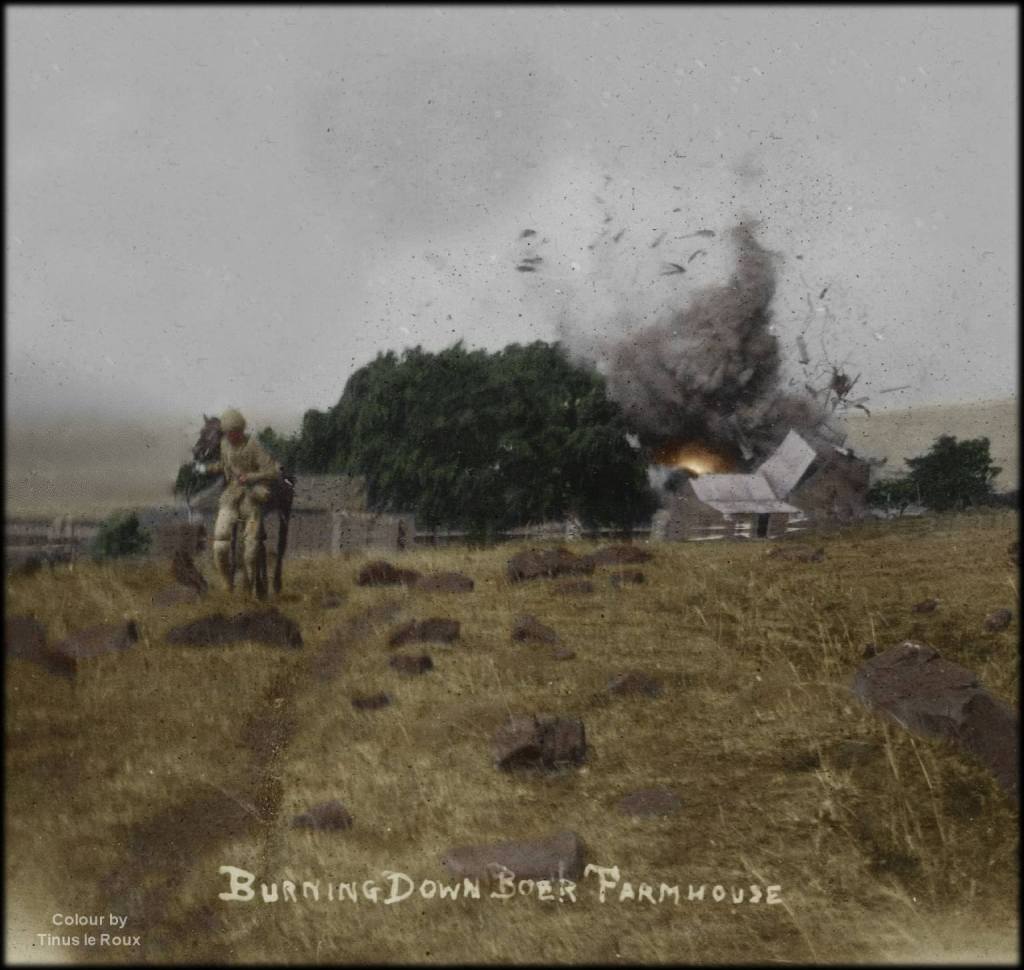
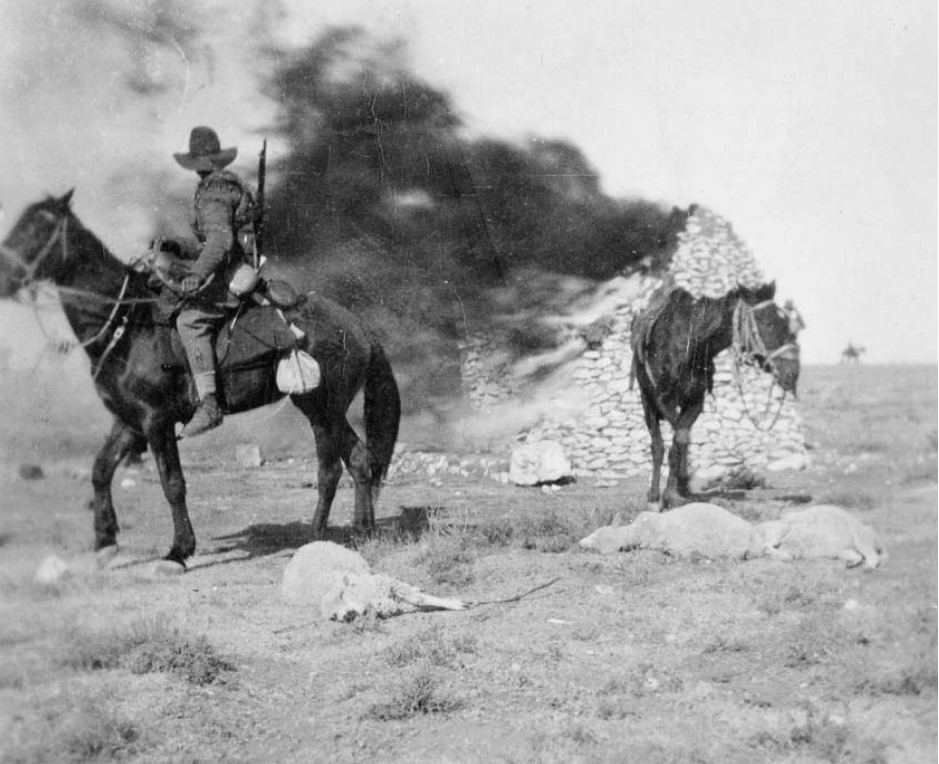
Images: Lord Kitchener’s policy of Scotched Earth, Boer farmsteads been destroyed by British and Imperial Troops.

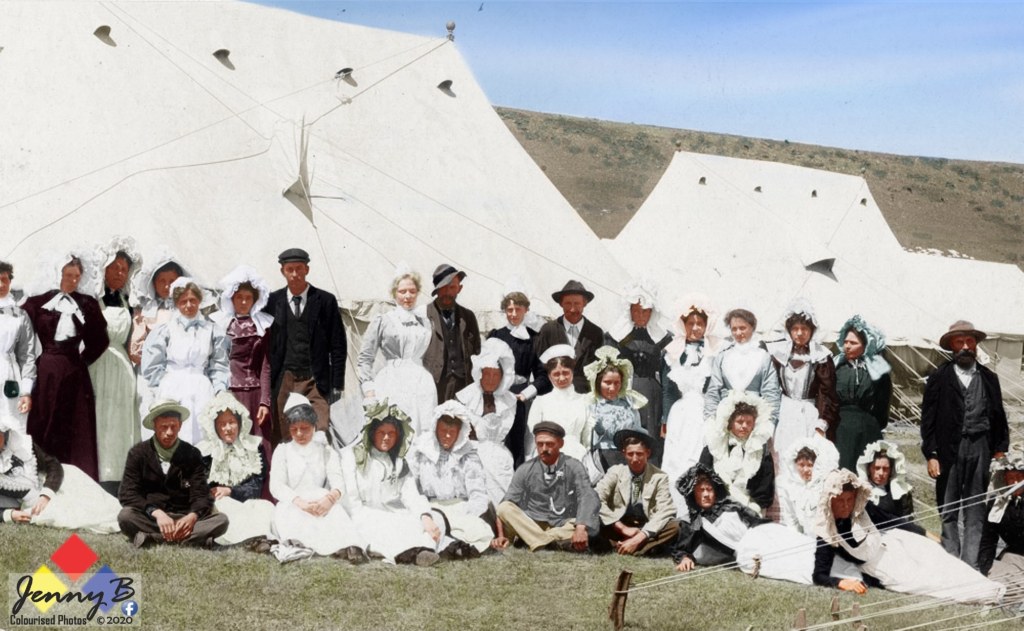

Images: British Boer War period concentration camps, colourised by Jenny B
Researched by Peter Dickens
With much thanks to ‘Boer War Crank’ on-line. Master images of a young Jan Smuts and concentration camp children – colourised thanks to Tinus Le Roux.

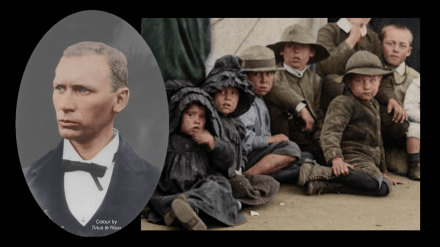
Thanks once more for your insights Peter. I have been fortunate to grow up in a home fiercely divided between Sappe and Natte. I recently inherited my father’s collection of Smuts books; just busy with The Religious Smuts by Piet Beukes. He was, to say the least, a very complex man; certainly ahead of his time.
Kind regards
Nick Burger
4 Oudeveld Close
Summerbrook Village
Robyn Street
Jukskei Park
Johannesburg
2188
karjomat@gmail.com karjomat@gmail.com
0829213578
LikeLiked by 1 person
Info has become so accessible now that for an avid reader (like myself), the buffet can and should be filtered aggressively to exclude obvious nonsense. This was one of those articles that held promise for only the briefest of moments. At the point where “…as ‘Afrikanerdom’ is as white as it is black…” occurred in the text, it was clear that it needed to be zapped to the cyber-trash immediately.
I mean really. Having lived in SA for many years as a semi-verloopte, anglophone Afrikaner and having prolific contact with Coloureds, Blacks, Indians and the rest of the ethnic tapestry, I just never came across any black people that call themselves Afrikaners.
There’s no indication in nature that diversity as a function of evolution is decreasing. It’s only proposed by those who (for whatever reason) desire drab equality. You’re talking shit boet.
LikeLike
My reference is a single sentence – and it alludes to the fact that Afrikanerdom is something which also factors Cape Colourds as an ethnic group and to what is now openly referred to as ‘First Peoples’ – that there is a separation between white – and lets call it ‘brown’ for your clarity and PC purposes – in identity is artificial (and ho hum .. caused by Apartheid .. yet again) – and its something that many historians and social commentators are trying to grapple with when dealing with what constitutes an ‘Afrikaner’. To the point (and its not my point mind) that Afrikaans is now been reviewed as an ‘indigenous language’ and not a European derivative (the ‘First People’ are taking the stance that its a slave language and therefore ‘Black’) .. not to get with all that hullabaloo and politically correct whatnot, so I thought I handled the issue pretty succinctly without the prerequisite ‘shit’ boet.
LikeLiked by 1 person
That is why I prefer to be called a Boer (more out of association than being being a desecendant of the Boers from the two Boer Republics, although there is a Cape Rebel in my ancestry) and not an Afrikaner. It cancells out any doubt of who and what you are. Interestingly, the term “Boer” has been surpressed amd almost written out of history after the ABO, only to be revived by the OB during WWII, and again by people like Robert van Tonder 40 years later.
LikeLike
It would be great if it where so easily categorised, my family is as ‘Boer’ as you can get, Bloemfontein NGK – down to the battle of Paardeberg, St Helna, the Martiz Revolt etc and the family farm was burned to the ground not once but twice – and not compensated for. But they do not identify as ‘Boer’ – they identify as Afrikaner, and there are very many like them – I served side by side with Afrikaners from Boer heritage who simply did not identify with it. It’s also complex and fractious to say ‘Boere’ are those from ‘The Republics’ – within this rank there is a high degree of division as a great many Boer families became ‘hensoppers’ or ‘joiners’ – and their farms in turned burned not by the British but the Boer Commandos in some instances. Bear in mind that both the OFS and ZAR where British Colonies prior to the 2nd Anglo Boer War, and their demographic makeup far more than strictly Boer. Also, as to Smuts (and Botha for that matter) many ‘Boer’ heritage Afrikaners do not see him as a traitor or turncoat at all, and see him as a reconciler and visionary. Statistically speaking – when you add the ‘Brown’ Afrikaners (Colourds) to the pool of Afrikanerdom the division between ‘Cape’ and ‘Boer’ white Afrikaners – and the division within ‘Boer’ white Afrikaners of ‘turncoats’ and ‘capitulators’ – makes the grouping of ‘anti-Smuts’ Afrikaners I refer very small, but as I said .. still very vocal.
LikeLiked by 1 person
You describe (through the words of Smuts) the Bittereinders and their motives well. Just one correction: The Bittereinders were not Afrikaners, but Boers who resided in the two Boer Republics. To call these Boer Bittereinders, “Afrikaners”, is historically wrong and an injustice to their suffering as Boerevolk! It was again these Boere Bittereinders and their sons that rebelled in 1914, and not “Afrikaners” as certain historians try to pretend (when looking for example at the book title “Afrikaner-rebellie”, which title should in fact be “Boere-rebellie”!)
LikeLike
Lastly, there is a huge divide between the Boere and genl Smuts as ex Boer leader, a divide that started already during the time that the Treaty of Vereeniging was signed, and escalated to climaxes during the 1914 Rebellion, and again during WWII. That is why you will find no sympathy for Smuts amongst the Boers today. That devide started when he walked over to the enemy and betrayed the Boers with whom he fought in the ABO. That is why he is more liked and honoured by the British than by the Boers!
LikeLike
Significant contribution, a true hero.
To my mind he actually overwhelmed the British, especially Churhhill, with his physisical and psychlogical guts, on horseback as bittereinder, to the shores at Port Elizabeth, and from there north to Oranjemundt being a Boer soldier and commander, exposing the enemy to a stark contradiction of negative perceptions about the Afrikaner personality. In my opinion the strategy to stretch the war into the Cape Province, where there were soft targets, and incidents of attacks was reported on iternationally.
.
LikeLike
Especially the older generation of Boers wetre similar to the Isralites in that they bekieved that they were God’s chosen people,thus teir acceptance of the suffering they edjured as a nation being God’s will. However they and subsequent generations developed a hatred for the English in particular that excluded to a certain degree the Scots, Welsh and Irish. As a result of this theycould and would not see the benefits of working with the English in contrast to the visions of Smuts and Louis Botha who realized that by aligning themselves with the English would result in many benefits for South Africa which apart fron economic benefits might also result in teritorial expansion of the South African territory. This bias against the Enblish by the nationalists has blighted our South African developement to this day. Apart from the hatred caused by the brutality of the Boer War the other bone of contension was thed nationalists attitude to the blacks and other people of colour which prevented the British government from giving the various South African states and colonies prior to and even after Union in 1910 carte blanch in running their own affairs.
LikeLiked by 1 person